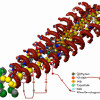
Delve into the realm of cholesterol, unraveling its nature, significance in the body, the health implications of elevated cholesterol levels, and effective strategies to maintain healthy cholesterol.
What is Cholesterol and Its Role in our Bodies?
Cholesterol is a waxy, fat-like substance found in all the cells of the body. Essential for the body's normal functioning, cholesterol is primarily responsible for building cells, synthesizing vitamin D, producing sex hormones, and producing bile acids needed for digestion. However, excess cholesterol in the body can pose serious health risks and lead to chronic ailments like heart diseases.
Types of Cholesterol
There are two main types of cholesterol: high-density lipoprotein (HDL) or 'good' cholesterol, and low-density lipoprotein (LDL) or 'bad' cholesterol. HDL carries cholesterol back to the liver, preventing it from building up in the arteries, hence it is considered good. Conversely, LDL carries cholesterol from the liver into the bloodstream where it can stick to the arterial walls, making it the bad cholesterol.
Health Implications of High Cholesterol
Increased levels of cholesterol, particularly LDL cholesterol, can lead to the build-up of plaque in the arterial walls, a condition known as atherosclerosis. This can reduce blood flow to vital organs like the heart and brain, resulting in heart attack or stroke. Furthermore, high cholesterol levels are also associated with peripheral vascular disease, type II diabetes, and high blood pressure.
Detection and Diagnosis of High Cholesterol
An imbalance in cholesterol levels is often detected through a blood test termed a lipid panel or lipid profile. Since high cholesterol manifests no outward symptoms, routine check-ups and blood tests are crucial for early detection.
Managing Cholesterol Levels for Heart Health
To maintain healthy cholesterol levels, it's essential to lead an active lifestyle, eat a heart-healthy diet, avoid tobacco smoke, and limit alcohol intake. Regular exercise can help raise your HDL cholesterol while reducing your LDL cholesterol and triglycerides. A diet rich in whole grains, lean protein, fruits, vegetables, and omega-3 fatty acids can help manage your cholesterol. Remember, it's not about eliminating cholesterol completely from your diet but balancing its different types for optimal health.
The Role of Medication in Cholesterol Management
In some instances, lifestyle changes may not suffice to lower cholesterol levels. Based on your risk factors and cholesterol levels, your healthcare provider may recommend medications. The medical approach mainly includes statins, nicotine acid, bile acid binding resins, and cholesterol absorption inhibitors. It is important to note that even when medication is prescribed, lifestyle changes remain an integral part of treatment.
















